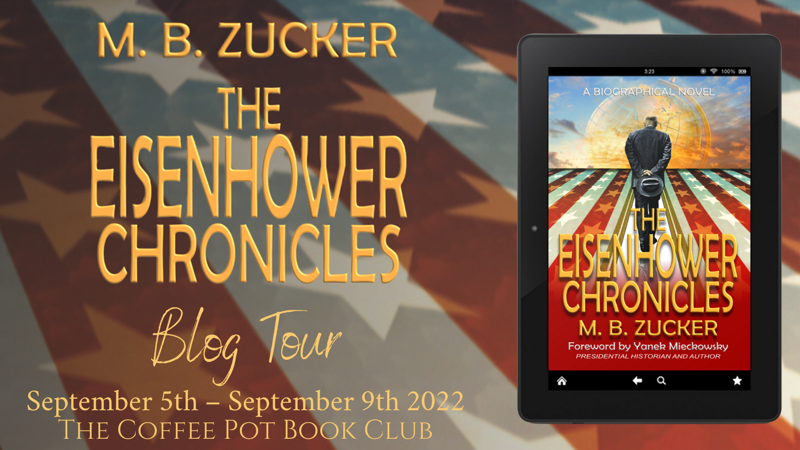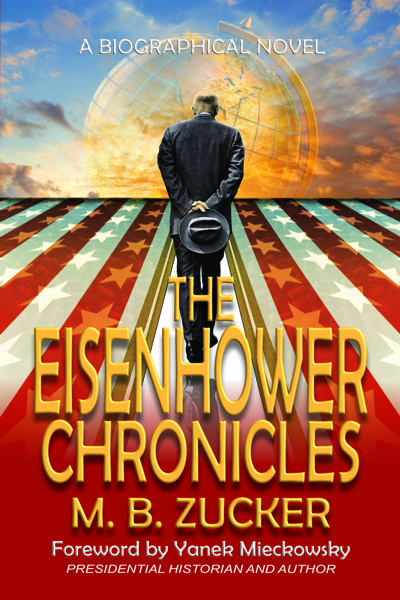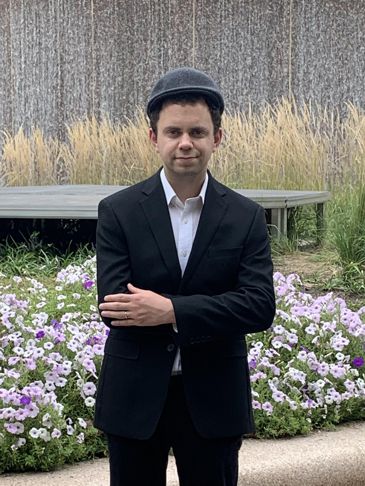
In 1938 he was a lieutenant colonel stationed in the Philippines; by 1945 the world proclaimed him its savior. From leading the forces of liberal democracy against history’s most evil tyrant to the presidency, Dwight D. Eisenhower fought for and kept the peace during the most dangerous era in history.
The Eisenhower Chronicles dramatizes Ike’s life, portraying his epic journey from unknown soldier to global hero as only a novel could. He is shown working with icons such as FDR, Winston Churchill, and Dr. Martin Luther King Jr., and confronting challenges like D-Day, the Little Rock Crisis, and Sputnik.
Eisenhower’s legacy is grounded in defending the world from fascism, communism, and nuclear weapons. This novel shows how he accomplished it all and takes readers into his mind and soul, grounding the history in the man who made it.

Excerpt
“Gentlemen, the President!” Cutler’s Boston Brahmin accent cut through the air. The entire National Security Council stood as Ike entered the Cabinet Room.
“Be seated,” Ike muttered curtly. His advisors sat down and noticed Ike’s brown plaid suit. That suit was a terrifying sight in the Eisenhower White House. It was the President’s signal that he was angry and not to be trifled with. Ike sat at the head of the table.
“I want to start with what we discussed in last week’s meeting. The issue of the Soviet H-bomb and the likelihood that they’ll hit us with it in the near future.”
“I fully believe this prediction will come to pass. It’s why we need to roll back communism. Or contain it at the very least,” Nixon interjected, determined to assert himself as a competent foreign policy thinker among the older, more experienced statesmen.
“It’s too expensive, Mr. Vice President,” Humphrey replied. “The Treasury Department’s analysis shows that NSC 68 will lead to a debt crisis by the decade’s end. We’ve avoided one already only because we ended the war in Korea and Truman’s wage and price controls.”
“Can we review what NSC 68 entails?” Ike asked. “We should be on the same page with what we’re dealing with here.” He turned to Cutler. “Robert, do you mind?”
“Of course, Mr. President,” Cutler replied as he glanced at his notes. “NSC 68 marked the final culmination of the Truman administration’s Cold War strategy. The document was written by Paul Nitze in 1950 and predicted that the Soviets would launch a nuclear strike on the US homeland in 1954 and that the US needed huge conventional forces to carry on the fight against communism after the Soviet strike. President Truman implemented the document after North Korea invaded South Korea in 1950, legitimizing Nitze’s predictions of a global communist conspiracy for world domination. This authorization quadrupled military spending to around sixty billion dollars by 1953. That dwarfs the annual level of defense spending during World War II.”
“And it will bankrupt the country if we maintain that level of spending for much longer,” Humphrey stated, slowly emphasizing each word and moving his thumb and index finger together as one unit. “We need to change the way we think about this situation. Opposing communism abroad and our finances at home are part of the same challenge. We need to think of the national debt as a greater threat to national security than the Soviet Union.”
“That’s absurd,” Admiral Radford replied. Radford was the architect of the US Navy’s aviation program during World War II and had recently succeeded Omar Bradley as Chairman of the Joint Chiefs of Staff. “The Reds are a bigger threat to the Free World than the Axis ever was. They threaten our security more than Robert E. Lee did 90 years ago. No amount of spending is too much in crushing them and their mission of world-wide tyranny.”
“I agree with George,” Ike responded. “We can’t afford to bankrupt ourselves in search of security. We’ll lose our freedoms and everything we’re trying to defend from the communists if we do.”
“I respectfully disagree, Mr. President,” Radford replied.
Ike frowned as he leaned forward in his chair. Most of the government thought the Soviets intended to launch a nuclear strike on the US within a year. Ike was skeptical of that prediction but knew they had to oppose communism. At the same time, he knew everyone but Secretary Humphrey and himself was prepared to spend as much as possible on the military for the duration of the Cold War. Ike believed that threatened America’s democratic way of life. But his nightmare from a few days ago had led him to think of another option for this situation. He decided to play the devil’s advocate to provoke a debate on his radical idea.
“I want us to consider the following thought experiment: Would it be morally wrong not to attack the Soviets before they have the capacity to hit the US? It looks to me as though the hour of decision is at hand, and that we presently have to face the question of whether we would throw everything at once against the enemy. The question can no longer be ignored. It’s our duty to answer it. Otherwise, we risk the likelihood of a giant nuclear Pearl Harbor.”
A grim silence sucked the life from the room. The prospect was horrifying. No one knew how to approach this hypothetical.
Dulles broke the silence. “To clarify, Mr. President, you’re talking about a preventive strike intended to destroy the entirety of the Soviet Union?”
“That’s correct, Foster. It’s the only way to guarantee that we’re neither hit ourselves nor that we’re forced to bankrupt ourselves.”
“Wouldn’t we also have to destroy the rest of the Iron Curtain? And Red China?” Allen Dulles asked, twirling an unlit pipe between his fingers under the conference table.
“We could consider that,” Ike replied. The men were tense for several long moments.
This time Radford broke the silence.
“This idea is logical. Communism must be opposed but the President and treasury secretary believe containment is too expensive. It is inevitable that the Soviets will hit us within a year or two if we don’t act preventively. They have a nuclear arsenal but lack the capacity to strike our mainland. We should take advantage of this fact before they develop that capacity.” The Dulles brothers, Nixon, and Cutler all nodded with Radford’s words. Ike folded his arms as the Chairman of the Joint Chiefs continued. “When I led a carrier group in ‘45, we firebombed Japanese cities where the buildings were made of wood and paper. It caused an inferno, but we were tasked with killing the bastards scientifically. We can now do the same with the Soviets.”
Ike’s stomach clenched. He wanted to vomit and felt his temples sweat as his insides somersaulted. He did not expect his advisors to consolidate around the idea of destroying Russia so quickly.
If I pull the trigger on this, that’s my legacy. Not Overlord, not the lasting peace I wanted to build. But the destruction of over 100 million people. And that’s only if we stop at Russia. These monkeys will want to take out the entire Eastern Bloc and China too. It will be far worse than the two World Wars combined. The story of this century will be of two wars that propelled America to world leadership and within ten years of that leadership America committed by far the greatest atrocity in the history of our species. My name will be permanently condemned as a butcher who made Hitler look saintly in comparison.
“You’re all on board with this?” Ike growled.
“We have to deal with the world as it is. Not as we would like it to be,” Dulles replied.
“This may very well be our best option. We can’t let the Soviets win or risk their hitting us on the one hand, but on the other we can’t afford to contain them with NSC 68,” Nixon said.
What credentials does he even have to give that type of advice? Ike thought, glaring at his Vice President but holding back his criticism.
“Should we notify the NATO allies of our intentions?” Wilson asked.
“It’s far too early for that,” Ike replied. “This concept is still in its cradle.”
“It would be the financially responsible thing to do,” Humphrey said, throwing in his two cents.
Ike turned to his treasury secretary, with whom he usually agreed on most issues.
“We’re talking about hundreds of millions of lives, George. This is about more than money.”
“I don’t understand, Mr. President,” Humphrey replied as he shifted his posture. “You raised this idea as an alternative to NSC 68. You wanted a way to protect the free world from communism without bankrupting ourselves and sacrificing the Constitution to a Garrison State. Why shouldn’t we weigh the financial costs?”
“I want us to keep in mind the Ukrainian villagers that would be incinerated by this idea. There’s more at stake than money,” Ike responded.
“No one wants to incinerate Ukrainian villagers,” Dulles interjected. “But our foremost job is to protect Americans. And the American people face an imminent existential threat that will lose no sleep incinerating them at the first opportunity. We have a short window to prevent that, and I think we should take it. It’s not our fault that Ukrainian villagers live under an atheistic, demonic ideology that seeks to destroy us.”
“But must this be so zero sum?” Ike asked, his temper rising. “Must this be our lives or theirs?”
“President Lincoln, the wisest man to ever hold this office, once said that a house divided against itself could not stand—” Nixon began.
“He didn’t say that two houses constructed differently, of different materials, of different appearance could not stand in peace within the same block. So, Lincoln’s analogy doesn’t apply to us and the communists.”
“Mr. President,” Wilson began, “You did what was necessary to defend freedom when you invaded Normandy in ‘44. That was the largest operation in history. Millions were involved. I don’t understand the difference between that and this idea.”
“That was clearly necessary,” Ike replied. “I want to make sure that there are no alternatives before we contemplate something so horrible as this option.”
“I don’t see what our alternatives are,” Humphrey said. “The Reds know they can only truly defeat us by attacking our economy. NSC 68 plays directly into their hands on that point.”
“I would add that allowing the Soviets to develop the capacity to hit us with atomic weapons would be incredibly irresponsible,” Radford stated. “History will draw comparisons to President Buchanan allowing the South to secede before the Civil War. So, to return to the Vice President’s Lincoln analogy, doing the preventive strike that you originally suggested might be the Lincolnian position here.”
Ike continued to feel sick as he thought about this conversation.
It’s insane that they’ve all jumped onto this idea so quickly. I’m still not convinced that the Russians plan on hitting us and triggering a nuclear exchange. They fought tooth and nail to defeat Hitler and the boys currently running the Kremlin survived Stalin’s terror. They’re not suicidal. They’re survivors. It doesn’t make any sense that they would provoke their own destruction. But that still leaves the problem of NSC 68. George is right that it is way too expensive. It’ll bankrupt the country, which must be avoided if democracy is to survive. But that doesn’t mean we can simply give up on containment. Moscow would rule the world in no time. The nation of Washington and Lincoln cannot be allowed to fall to the ideology of Marx and Lenin! If only there was another option to allow us to contain communism without breaking the bank on such large-scale forces. It doesn’t help that maintaining such a huge military creates the ability, and therefore the pressure, to wage more limited wars like Korea. I have to find a way to keep us out of war without giving up on containment and without bankrupting the country.
Ike flexed his mental muscle to calm his stomach as he leaned forward. “We’ve beat this subject to death. Let’s move on to another. We should make our mistakes slowly and proceed cautiously.”
Universal Link: https://books2read.com/u/bp8VVE
Amazon UK: https://www.amazon.co.uk/gp/product/B0B3BX3S7B
Amazon US: https://www.amazon.com/Eisenhower-Chronicles-M-B-Zucker-ebook/dp/B0B3BX3S7B
Amazon CA: https://www.amazon.ca/Eisenhower-Chronicles-M-B-Zucker-ebook/dp/B0B3BX3S7B
Amazon AU: https://www.amazon.com.au/Eisenhower-Chronicles-M-B-Zucker-ebook/dp/B0B3BX3S7B
Barnes and Noble: https://www.barnesandnoble.com/w/the-eisenhower-chronicles-m-b-zucker/1141588964?ean=9780578288048
Waterstones: https://www.waterstones.com/book/the-eisenhower-chronicles/m-b-zucker/historium-press/9798218011680
Kobo: https://www.kobo.com/us/en/ebook/the-eisenhower-chronicles
Meet M. B. Zucker

M. B. Zucker has been interested in storytelling for as long as he can remember. He discovered his love of history at fifteen and studied Dwight Eisenhower for over ten years. Mr. Zucker earned his B.A. at Occidental College and his J.D. at Case Western Reserve University School of Law. He lives in Virginia with his wife.
Connect with Michael
Website: https://www.michaelbzucker.com
Twitter: https://twitter.com/MBZuckerBooks and https://twitter.com/michaelzucker1
Facebook: https://www.facebook.com/profile.php?id=100061516155957
LinkedIn: https://www.linkedin.com/feed/
Amazon Author Page: https://www.amazon.com/M-B-Zucker/e/B09JM74HMF
Goodreads: https://www.goodreads.com/author/show/21882348.M_B_Zucker